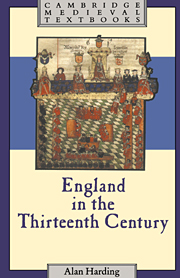Book contents
- Frontmatter
- Contents
- Preface and acknowledgements
- List of abbreviations
- Chronological table
- 1 Introduction: sources and interpretations
- 2 The peasants and the land
- 3 Traders and townsmen
- 4 Professional people
- 5 Knights
- 6 Magnates
- 7 Thirteenth-century politics
- Conclusion: the making of a state
- Guide to further reading
- Index
- Cambridge Medieval Textbooks
5 - Knights
Published online by Cambridge University Press: 05 June 2012
- Frontmatter
- Contents
- Preface and acknowledgements
- List of abbreviations
- Chronological table
- 1 Introduction: sources and interpretations
- 2 The peasants and the land
- 3 Traders and townsmen
- 4 Professional people
- 5 Knights
- 6 Magnates
- 7 Thirteenth-century politics
- Conclusion: the making of a state
- Guide to further reading
- Index
- Cambridge Medieval Textbooks
Summary
Professional people, like the peasantry and tradesmen, existed to serve the lords of the land, who were themselves being drawn into administrative roles. The lords were united by their own ideas of honourable service within a hierarchy leading up to the king as lord paramount, and by the practicalities of the land tenure which sealed relationships of vassalage. Because the service of the lay lords was originally that of the knights who gave the Conqueror his throne, the relationship was also the source of politics. By 1200 the knight's fee had become hereditary property, and the development of a land market was weakening the connection between the hierarchy of lordship and the distribution of wealth. As landholders, moreover, the lords were subject to the economic pressures of the thirteenth century, at the same time as their military service was being transformed into the exercise of territorial authority in the name of a developing state. The two sorts of change combined to force the magnates to rebuild their relationships with the knights of the shires on a new footing.
KNIGHTS AT WAR
The early thirteenth century was the great age of the chivalric romances about King Arthur's court, which glorified the military prowess of knights in the service of their lords and ladies and of the Church founded by Our Lord, in supreme works of European literature such as Wolfram von Eschenbach's Parzival and Gottfried von Strassburg's Tristan.
- Type
- Chapter
- Information
- England in the Thirteenth Century , pp. 180 - 219Publisher: Cambridge University PressPrint publication year: 1993



